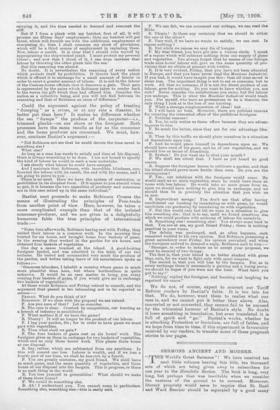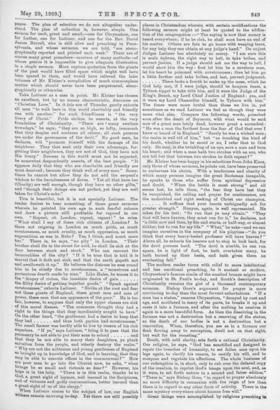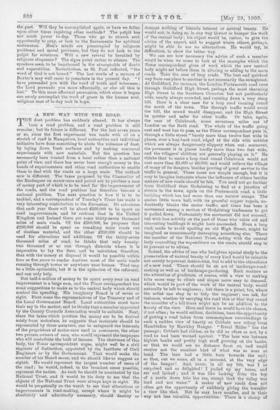SERMONS ANCIENT AND MODERN.
"THE World's Great Sermons"! We have received ten neat little volumes bearing this title, ten thousand sets of which are being given away to subscribers for one year to the Homiletic Review. The book is long, very long, but perhaps that was inevitable when we consider the vastness of the ground to be covered. Moreover, literary propriety would seem to require that St. Basil and Ward Beecher should be separated by a good many
pages. The plan of selection we do not altogether under- stand. The plan of collection is, however, simple. One sermon for each, great and small,—one for Chrysostom, one for Luther, one for Latimer, and one for the Rev. David James Burrell, who is still alive and preaching in Penn- sylvania, and whose sermons, we are told, "are steno- graphically reported and printed each week." There are of course many great preachers—masters of many methods—of whose genius it is impossible to give adequate illustration in a single sermon. More copious quotation from the giants of the past would have filled space which might well have been spared to them, and would have relieved the later volumes of Mr. Kleiser's compilation of much commonplace matter which should never have been perpetuated, steno- graphically or otherwise.
Take Latimer as a case in point. Mr. Kleiser has chosen an excellent, but by no means characteristic, discourse on "Christian Love." In it this son of Thunder gently exhorts all men "to walk here in this world charitably and friendly one with another," for such friendliness is " the very livery of Christ." Pride strikes, ho asserts, at the very foundation of Christianity. "There are s many metiers nowadays," he says; " they are so high, so lofty, insomuch that they despise and contemn all others; all such persons are under the governance of the devil." No good man, he declares, will "promote himself with the damage of his neighbour. They that seek only their own advantage, for- getting their neighbours, they are not of God, they have not His livery." Success in this world must not be expected, be somewhat despondently asserts, of the best people. "It appears daily that they who are charitable and friendly are most deceived; because they think well of every man." Some- times he cannot but allow they do not add the serpent's wisdom to the harmlessness of doves. " Yet all that have her (Charity) are well enough, though they have no other gifts," and "though their doings are not perfect, yet they are well taken for Christ's sake."
This is beautiful, but it is not specially Latimer. The reader desires to hear something of those great sermons wherein he painted his own age in such fearful colours and drew a picture still profitable for reproof in our own. " Repent, oh London, repent, repent I " he cries. "What shall I may of these rich citizens of .London P Is there not reigning in London as much pride, as much covetousness, as much cruelty, as much oppression, as much superstition as was in Nebo ? Yes, I think, and much more too." There is, he says, "no pity " in London. " Their brother shall die in the street for cold, he shall lie sick at the door between stock and stock." Who can recount the immoralities of the city P " If it be true that is told it is marvel that it cloth not sink, and that the earth gapeth not and swalloweth it up." He believes the distress he sees round him to be chiefly due to covetousness, a " monstrous and portentous dearth made by man." Like Hales, he traces it to the " dropsy of riches, the insatiate desire of gain the filthy desire of getting together goods." " Speak against Covetousness," exhorts Latimer. " Strike at the root and fear not these giants of England, these great men and men of power, these men that are oppressors of the poor." He is too fair, however, to suppose that only the upper classes are sick of this moral disease. " The commons thought they had a right to the things that they inordinately sought to have." On the other hand, "the gentlemen had a desire to keep that
they had and thus both parties had covetousness." The small farmer was hardly able to live by reason of his rich superiors. "If ye," says Latimer, " bring it to pass that the yeomanry be not able to put their sons to school and that they be not able to marry their daughters, yo pluck salvation from the people, and utterly destroy the realm." "Why are not the noblemen and young gentlemen of England so brought up in knowledge of God, and in learning, that they may be able to execute offices in the commonweal P" How are poor men to go into the Church now, he asks, " when
livings be so small and victuals so dear ?" However, his hope is in the laity. " There is in this realm, thanks be to God, a groat sight of laymen, well learned in the Scriptures, and of virtuous and godly conversations, better learned than a great sight of us of the clergy."
When Latimer comes to the subject of law, our English withers remain unwrung to-day. Yet there are still possibly places in Christendom wherein with certain modifications the following sermon might at least be quoted to the edifica- tion of the congregation :—" The saying is now that money is heard everywhere; if he be rich, he shall soon have an end of his matter. Others aro fain to go home with weeping tears, for any help they can obtain at any judge's hand." On unjust Judges Latimer has absolutely no mercy. "I am sure this is scale tnferna, the right way to hell, to take bribes, and pervert justice. If a judge should ask me the way to hell, I would show him the way : first let him be a covetous man, let his heart be poisoned with covetousness ; then let him go a little further and take bribes, and last, pervert judgment.
There lacks a fourth to make up the mess, which (so God help me), if I were judge, should be hangam ilium, a Tyburn tippet to take with him, and it were the Judge of the King's Bench, my Lord Chief Justice of England : yea, and it wore my Lord Chancellor himself, to Tyburn with him." The times were more brutal than those we live in, yet sometimes as we read Latimer we feel as though they were more vital also. Compare the following words, preached soon after the death of Seymour, with what would be said now of a great man lately dead, however great a scoundrel : " He was a man the farthest from the fear of God that ever I knew or heard of in England." "Surely ho was a wicked man; the realm is well rid of him," but "as touching the kind of his death, whether he be saved or no, I refer that to God only. He may, in the twinkling of an eye, save a man and turn his heart; and when a man bath two strokes with an axe, who can tell but that between two strokes ho cloth repent P " Mr. Kleiser has been happy iu his selections from John Knox, only three of whose sermons, he points out, have been preserved to embarrass his choice. With a tenderness and charity of which many persons imagine the great Scotsman incapable, he speaks to those who suffer from spiritual depression and doubt. " When the battle is most strong " and all seems lost, he tells them, "the fear they have lest they be vanquished, the calling and prayer for continuance, are the undoubted and right seeking of Christ our champion.
It suffices that your hearts unfeignedly sob for greater strength." Bunyan, again, is well represented. He takes for his text : "So run that ye may obtain." " They that will have heaven, they must run for it," he declares, not "a little now and then, by fits and starts, or half-way, or almost thither, but to rnn for my life." " What," he asks—and we can imagine ourselves in the company of his pilgrims—" do you think that every heavy-heeled professor will have heaven P " Above all, he exhorts his hearers not to stop to look back, for the devil pursues hard. " The devil is nimble, he can run apace, ho is light of foot, he bath overtaken many, he hath turned up their heels, and bath given them an everlasting fall."
The modern reader turns with relief to more intellectual and less emotional preaching, be it ancient or modern. Chrysostom's famous simile of the smelted bronze might have originated in St. Paul's to-day, and South's description of Christianity remains the gist of a thousand contemporary sermons. Bishop Gore's argument for prayer is more convincing to-day than the most fervent exhortations. "If a man has a statue," reasons Chrysostom, "decayed by rust and age, and mutilated in many of its parts, he breaks it up and casts it into a furnace, and after the molting he receives it again in a more beautiful form. As then the dissolving in the furnace was not a destruction but a renewing of the statue, so the death of our bodies is not a destruction but a renovation. When, therefore, you see as in a furnace our flesh flowing away to corruption, dwell not on that sight, but wait for the recasting."
South, with cold clarity, sets forth a rational Christianity. Our religion, he says, " God lies sanctified and designed to repair the breaches of humanity, to set fallen man upon his legs again, to clarify his reason, to rectify his will, and to compose and regulate his affections. The whole business of our redemption is, in short, only to rub over the defaced copy of the creation, to reprint God's image upon the soul, and, as it were, to set forth nature in a second and fairer edition."
"There is," says Bishop Gore, " in regard to prayer absolutely no more difficulty in connexion with the reign of law than there is in regard to any other form of activity. There is the same mystery everywhere about human free will."
Great things were accomplished by religions preaching is
the.past. Will they be accomplished again, or have we fallen upon other times requiring other methods P The pulpit bee not much power to-day. Those who go to church seek opportunity to pray, or look to the Sacraments for spiritual sustenance. Men's minds are preoccupied by religious problems and moral problems, but they do. not look to the pulpit for solutions. Will a new revival be heralded by religious eloquence? The aligns point rather to silence. The speakers seem to be imprisoned in the strongholds of doubt and superstition. Nevertheless, as St. Paul reflected, "the word of God is not bound." The last words of a sermon of Baxter's may well recur to preachers in the present day. "I have persuaded you' with the word of truth and soberness ; the Lord persuade you more effectually, or else all this ie lost." To this more effectual persuasion, which since it began can surely accomplish the work of grace in the human soul, religious men of to-day look in hope.








































 Previous page
Previous page